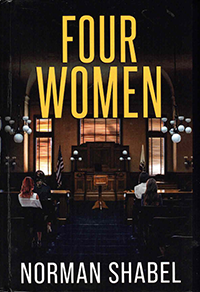Four Women by Norman Shabel; independently published © 2023; ISBN 9798386-914165; 403 pages; $13.99 on Amazon.

 SAN DIEGO – An alcoholic, self-doubting lawyer represents clients in two cases he honestly doesn’t expect to win. However, wearing a thread-bare suit he saves for trials and with a diminishing balance in his bank account, he figures he’ll go for broke.
SAN DIEGO – An alcoholic, self-doubting lawyer represents clients in two cases he honestly doesn’t expect to win. However, wearing a thread-bare suit he saves for trials and with a diminishing balance in his bank account, he figures he’ll go for broke.
One fictional case, which author Shabel portrays convincingly, pits trial attorney Joshua Logan against the manufacturer of a vat into which client George Banash fell while trying to adjust the temperature of the boiling contents inside. Another defendant in the case to determine how much compensation the badly disfigured Banash should be compensated is the company’s insurance company.
Another fictional case, from which the novel’s title is derived, is about four Jewish women whose property on the Miami shoreline is coveted by a wealthy, mysterious German-speaking developer with deep political connections. If the women, including Joshua’s aunt Helen, a Holocaust survivor, don’t accept the developer’s paltry financial offer, he threatens to have the city condemn the property in favor of high-rise development. Joshua negotiates for the women.
Each of the four women –Helen, and her friends Mary, Rachel, and Lilly – narrate their World War II experiences as the novel proceeds. The commandant of Auschwitz brutalized Helen as his sex slave. Lilly, a nurse, met Helen while serving in the medical corps that treated Holocaust survivors. Rachel served in the Jewish underground in Europe, helping to safely transport 2,500 Jewish children to Palestine. Mary, an American war widow, is a journalist.
Two of these women, having had less-than-thrilling sexual encounters with men, find satisfaction in each other’s arms.
However, as the novel moves along, it is not the women who are the central characters. It is their lawyer, Josh Logan, whom author Shabel moves to the center of our consciousness. Given that Shabel is a lawyer, himself, as well as a novelist and playwright, this perhaps should not be surprising.
In addition to the courtroom and the lawyer’s office, the novel takes us along the surreptitious route from Europe to British Mandatory Palestine; in the home of the concentration camp commander; in a hospital where one of the women undergoes cancer surgery; to Wolfie’s Delicatessen in Miami and to many other bars and restaurants; and to off-Broadway meetings at which Rachel’s child-smuggling experiences are grist for a drama on stage.
So many characters and situations militate against deep exploration of any particular one of them. The novel moves along with determination and the outcomes of both cases are revealed before the epilogue.
*
Donald H. Harrison is publisher and editor of San Diego Jewish World.